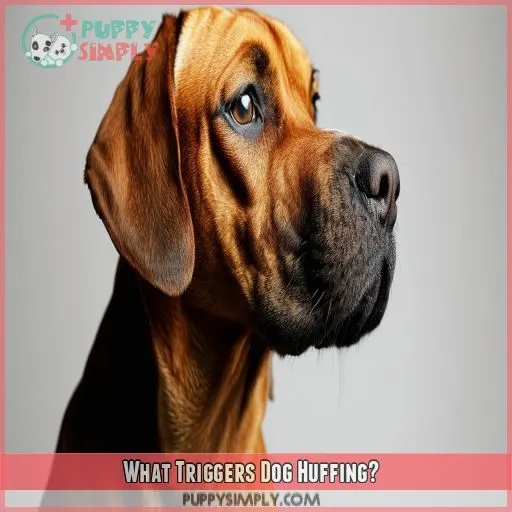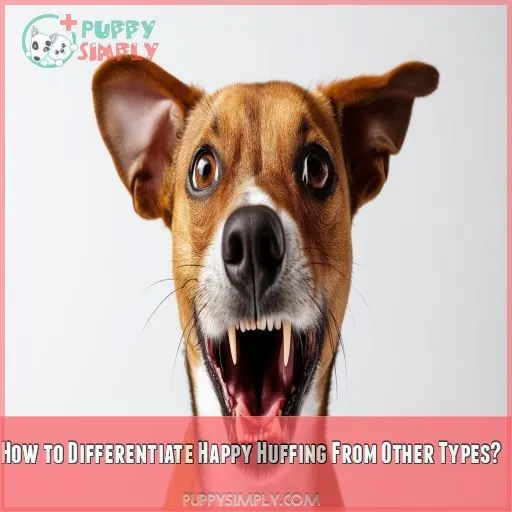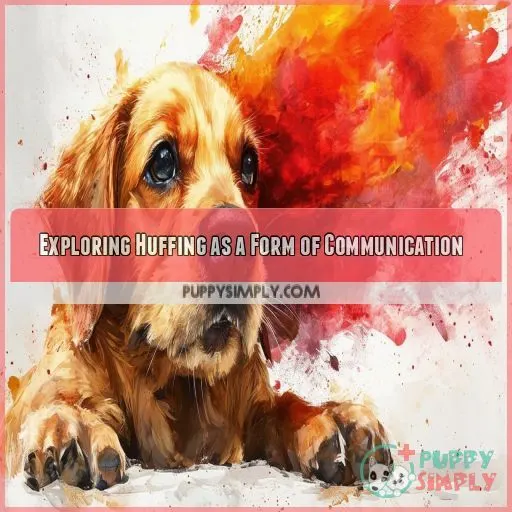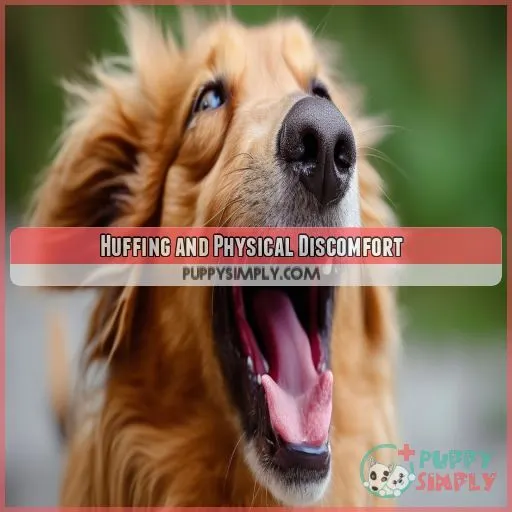This site is supported by our readers. We may earn a commission, at no cost to you, if you purchase through links.
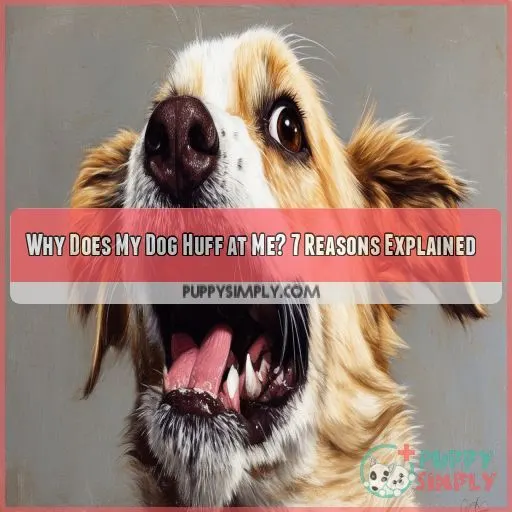 Ever wondered why your dog huffs at you?
Ever wondered why your dog huffs at you?
There are a variety of reasons for this behavior, which can range from physical discomfort to emotional communication.
In this article, we will explore these reasons, including stress, anxiety, and medical issues. We will also discuss how to interpret these huffs and offer guidance on when to seek veterinary help.
Table Of Contents
- Key Takeaways
- Why Does My Dog Huff at Me?
- What Triggers Dog Huffing?
- How to Differentiate Happy Huffing From Other Types?
- Exploring Huffing as a Form of Communication
- Huffing and Physical Discomfort
- Frequently Asked Questions (FAQs)
- What does it mean when a dog huffs?
- Why does my dog look at me and huff?
- Do dogs huff when they’re happy?
- Why does my dog keep making a huffing noise?
- How can I help my huffing dog?
- Do dogs normally huff in their sleep?
- Why do dogs huff when excited?
- What does dog huffing and puffing indicate?
- Can dog huffing lead to health concerns?
- Conclusion
Key Takeaways
Sometimes, dogs huff and puff because they’re like little kids; they need to blow off some steam after throwing a tantrum.
If your dog’s huffing is accompanied by symptoms like sneezing, excessive drooling, or a cough, then it’s best to consult your vet.
Dogs have their own unique language, and huffing is one of the many ways they communicate and express themselves to us.
If your dog is huffing at you, they’re essentially saying, "Hey, pay attention! I want to tell you something!
Why Does My Dog Huff at Me?
There are several reasons why your dog might huff at you. It could be their way of expressing emotions, such as affection or disappointment, or even a sign of stress or anxiety. Huffing can also be a reaction to physical discomfort, like respiratory issues or allergies. The context and your dog’s body language will give you clues as to what might be triggering their huffing. Understanding these triggers will help you know how to respond appropriately.
There are several reasons and I can explain them to you if you want to know more.
What Triggers Dog Huffing?
Dog huffing can have various triggers such as reverse sneezing, allergens, physical exertion, stress, and medical conditions. Understanding these triggers can help you determine if your dog is expressing emotions, seeking attention, or indicating an underlying health concern.
Reverse Sneezing
Reverse sneezing is a common occurrence in dogs, and it can be concerning if you don’t know what’s triggering it. Here’s what you need to know about reverse sneezing and how to manage it:
Reverse Sneezing Triggers and Causes:
- Physical exertion: After intense exercise or play, your dog might experience reverse sneezing.
- Stress and anxiety: Emotional triggers can lead to reverse sneezing.
- Medical conditions: Underlying health issues could be a factor.
Prevention and Treatment:
- Identify and avoid triggers: Determine what sets off your dog’s reverse sneezing and minimize exposure.
- Massage technique: Gently massage your dog’s throat to help soothe the spasms.
- Encourage swallowing: Offer a treat or a small amount of water to trigger swallowing and stop the episode.
Prognosis and When to Seek Help:
- Most episodes resolve quickly: Reverse sneezing typically stops within a couple of minutes.
- Contact your vet: If episodes are frequent, prolonged, or accompanied by other symptoms, consult your veterinarian for guidance and treatment options.
Allergens
Allergens can be a common trigger for dog huffing, and identifying the specific allergens affecting your dog is essential. It could be anything from pet dander to pollen. Creating a hypoallergenic home environment and implementing allergen avoidance strategies can help manage your dog’s huffing.
| Allergen Identification | Allergen Testing | Allergen Avoidance |
|---|---|---|
| Pet dander | Blood/skin testing | Hypoallergenic home |
| Pollen | Elimination diets | Allergen-free products |
| Carpet powders | Inhalant testing | Regular cleaning |
Physical Exertion
Aside from allergens, your dog’s huffing can also be triggered by physical exertion. When your dog engages in strenuous exercise or activities, their heart rate increases, and they may start huffing as a way to cool down and regulate their body temperature. Here are some key points to take into account:
- Exercise Intensity: Be mindful of the intensity and duration of your dog’s exercise routines. If they’re overexerted, they may start huffing heavily, indicating they need a break.
- Signs of Exhaustion: Keep an eye out for other signs of exhaustion, such as excessive panting, shaking off, or raised hair. These could indicate that your dog is struggling to catch their breath and needs to rest.
- Breathing and Heart Rate: Monitor your dog’s breathing and heart rate during and after exercise. If their breathing remains labored or their heart rate stays elevated for an extended period, it might be a sign of overexertion or an underlying health issue.
Stress and Anxiety
Dogs, like humans, experience stress and anxiety, which can cause them to huff.
This could be due to a variety of triggers, such as loud noises, separation, or unfamiliar environments.
It is important to identify these triggers and provide emotional support and calming techniques to help your dog manage their stress.
Reassurance is key to helping your dog feel secure and reducing their anxious huffing.
Medical Conditions
While huffing can be a normal dog behavior, it may also indicate underlying health issues.
Respiratory problems or allergies could be triggering your dog’s huffing.
If this is the case, other symptoms may include exercise-induced huffing, fear, diarrhea, loss of appetite, spacing out, or excessive sleepiness.
Consult your veterinarian for specific advice and treatment, especially if you notice any of these additional symptoms. Allergy management can also help reduce huffing caused by allergens such as carpet powders, cleaners, or pollen.
How to Differentiate Happy Huffing From Other Types?
When trying to differentiate happy huffing from other types, pay attention to your dog’s body language and the context in which the huffing occurs. Consider vocalization patterns, environmental cues, and your dog’s overall behavioral response to the situation.
Body Language Analysis
Your dog’s body language provides important clues to understanding the meaning behind their huffs. Here’s how to differentiate various types of huffing:
- Huffing and dominance: A huff accompanied by a dominant body posture, such as a raised tail and pricked ears, may indicate a display of dominance or assertion.
- Huffing and submission: Conversely, if your dog huffs while displaying submissive body language, such as lowered ears and a tucked tail, it could be a sign of submission or deference.
- Huffing and play: When huffing during playtime, your dog might be expressing excitement or anticipation. Look for playful body language, like a relaxed, wiggly body, and a playful eye gaze.
- Huffing and grooming: If your dog huffs while being groomed, it could be a sign of discomfort or irritation. Pay attention to their body language for signs of tension or resistance.
Context of the Huffing
The context of your dog’s huffing can provide valuable clues about their emotional state and intentions.
For example, if your dog sighs contentedly after playing, snuggling, or enjoying a tasty meal, it’s likely that they are expressing satisfaction and relaxation.
On the other hand, if your dog sighs when you don’t give them attention or when a fun game comes to an end, they may be expressing disappointment or seeking more interaction.
Vocalization Patterns
Vocalization patterns can provide valuable insights into your dog’s emotional state. Dogs use a variety of sounds to communicate, and by paying attention to the quality and frequency of their vocalizations, you can differentiate between happy huffing and other types of huffing.
For example, the vocal repertoire of dogs includes sighing, which can indicate contentment after playing, snuggling, or eating. On the other hand, sighing can also signal boredom or disappointment when there’s a lack of stimulation or attention.
Additionally, panting is a common vocalization that serves multiple purposes. While it’s often associated with cooling down, dogs also pant when they’re excited, anxious, or stressed.
Environmental Cues
Environmental cues play a role in your dog’s huffing behavior. Consider these factors:
- Outdoor allergies: Pollen sensitivity and seasonal allergies can trigger huffing.
- Indoor allergens: Carpet powders and cleaners can irritate your dog’s respiratory system, leading to huffing.
- Tiredness: Dogs may sigh when they’re tired, so observe if huffing occurs after physical activity.
- Pain: A dog may sigh to express discomfort, so consider if huffing coincides with potential pain triggers.
- Emotions: Disappointment or anticipation, like when your dog eats too fast, can lead to huffing.
Behavioral Response
Happy huffing is a unique form of dog communication, showing contentment and trust. It’s their way of expressing happiness and comfort with you. Think of it as their "happy place."
However, sometimes, huffing can indicate discomfort or stress. By paying attention to their body language, you can differentiate between happy huffing and other types. Look for relaxed postures, calm breathing, and a peaceful expression.
Context is key. If they’re huffing after a fun play session or a good snuggle, it’s likely a sign of contentment. Trust your instincts and observe their overall behavior to confirm that your furry friend is happy, healthy, and huffing away!
Exploring Huffing as a Form of Communication
Huffing can be an essential part of how your dog communicates, whether it’s to express emotions, seek attention, or indicate discomfort. Understanding these subtle cues helps you respond appropriately, strengthening your bond and ensuring your furry friend’s well-being.
Emotional Expression
Your dog’s huffing can convey a range of emotions, from contentment to disappointment. Here are three ways huffing can be an emotional expression:
- Communicating Affection: A contented dog may huff after playing, snuggling, or enjoying a tasty meal.
- Warning Signs: If your dog is feeling disappointed or bored, they might huff as a way to express their dissatisfaction.
- Seeking Attention: Sometimes, huffing can be your dog’s way of seeking attention or affection, especially if they combine it with other behaviors like whining or following you around.
Social Interaction
Huffing can also serve as a means of social interaction and communication for your dog.
It can be their way of asserting dominance or conveying aggression during play or when engaging with other dogs.
For instance, your dog might huff to say, "I’m the boss here" or "Back off; this is my toy."
This type of huffing is often coupled with specific body language cues, such as raised hackles, stiff posture, or a direct, unwavering stare.
Seeking Attention or Affection
Sometimes, your dog’s huffing could be their way of seeking your attention or affection. Here are three ways to know if this is the case:
- Attention-seeking cues: Your dog might combine huffing with other behaviors, such as making eye contact, whining softly, or even doing a little dance to catch your eye. They might also nudge you with their nose or paw as a gentle reminder that they’re waiting for some love and attention.
- Bonding through huffing: Some dogs use huffing as a way to initiate or strengthen their bond with you. They might huff as they snuggle up close, asking for a belly rub or inviting you to play a game of fetch. It’s their way of saying, "Let’s spend some quality time together."
- Playful huffing: If your dog is in a playful mood, they might huff while bringing you their favorite toy or doing a goofy zoomie around the house. It’s their way of inviting you to join in on the fun and games! They might even be asking you to initiate playtime by huffing at you in anticipation of a fun activity.
Warning Signs
While huffing can be a sign of your dog seeking attention or affection, it’s important to recognize when it may be a warning sign.
Be mindful of the context and your dog’s body language, vocalizations, and behavior. For example, is your dog huffing while displaying signs of stress or anxiety, such as panting, flattened ears, or avoiding eye contact?
Understanding these warning signs will help you respond appropriately and protect your dog’s well-being.
Establishing Trust and Bonding
Establishing trust and bonding with your dog is fundamental for a healthy relationship and can even help prevent unwanted behaviors like huffing. As a dog owner, you can employ various bonding techniques and behavior modification strategies to strengthen your emotional connection with your furry friend.
Focus on building trust through consistent care, affection, and positive reinforcement. This will create a safe and predictable environment for your dog, fostering a strong bond. Additionally, pay attention to your dog’s unique personality and preferences to tailor your interactions effectively.
Huffing and Physical Discomfort
If your dog’s huffing seems abnormal, it may be a sign of pain or respiratory issues. It’s imperative to consult a veterinarian to check on their well-being and manage any potential health concerns.
Pain or Discomfort Indicators
Aside from huffing, your dog might exhibit other discomfort cues, such as specific body language and vocalizations. For example, they may lick their lips, pant, or drool excessively. They could also cough, sneeze, or hold their breath. These signs could indicate respiratory issues, so it’s important to pay attention and seek veterinary advice if you’re concerned.
Respiratory Health Concerns
Besides signaling pain or discomfort, your dog’s huffing could also indicate respiratory health issues.
Reverse sneezing, marked by rapid in-and-out breathing accompanied by honking sounds, may be a cause for concern.
Common allergens such as carpet powders, cleaning products, and pollen can trigger these episodes.
Be vigilant about potential allergens in your dog’s surroundings and consult your veterinarian if you observe any recurring patterns or persistent problems.
Seeking Veterinary Consultation
If your dog’s huffing persists or is accompanied by other signs of physical discomfort, it’s important to consult a veterinarian. They can help rule out any underlying medical conditions and provide appropriate treatment. Don’t hesitate to seek professional advice if you’re concerned about your furry friend’s well-being.
Managing Physical Well-being
If your dog’s huffing persists or is accompanied by other concerning symptoms, it’s important to consult your veterinarian. They can examine your dog, rule out any serious health issues, and provide guidance on managing your dog’s well-being.
Frequently Asked Questions (FAQs)
What does it mean when a dog huffs?
A dog huffing can mean a few things. It could be a form of stress relief, or a sign of excitement and happiness. It can also be a precursor to aggression, especially if your dog is warning another dog.
Why does my dog look at me and huff?
Dogs huff for many reasons. Perhaps your dog is experiencing distress, or they’re trying to get your attention. Maybe they’re overexcited, or they’ve allergies, nasal mites, or respiratory issues.
Do dogs huff when they’re happy?
Yes, dogs often huff when they’re happy or excited. They may also huff when they’re anticipating something exciting, like a reward.
Why does my dog keep making a huffing noise?
Your dog could be making a huffing noise for a variety of reasons. It could be due to allergies, irritants in the throat, overexcitement, stress, or even as a way to communicate. If you’re concerned, it’s best to consult a vet to rule out any medical conditions.
How can I help my huffing dog?
If this is the first time your dog is huffing, take them to the vet to rule out anything serious. You can also cover your dog’s nostrils and have them take a deep breath to clear their airways. Try to identify patterns in their huffing to help you find a solution.
Do dogs normally huff in their sleep?
Yes, dogs can huff and puff in their sleep. They dream like humans and may be reacting to something in their dreams.
Why do dogs huff when excited?
Huffing and puffing is a form of stress relief for dogs and can be a precursor to aggressive behavior. It can also be a sign of a reverse sneeze, caused by allergens. Dogs also huff and puff when excited, which is known as a ‘play sneeze’.
What does dog huffing and puffing indicate?
Huffing and puffing in dogs can indicate stress or excitement. It may be a form of stress relief or a precursor to escalating aggressive behaviors. Certain breeds, like pugs and boxers, are more prone to huffing and puffing.
Can dog huffing lead to health concerns?
Huffing is usually benign and part of a dog’s natural language. However, if it’s accompanied by heavy breathing, it could be a sign of heatstroke, which requires immediate attention.
Conclusion
Huffing is a fascinating form of dog communication, and now you’re equipped with insights into its nuances. You can decipher the emotional landscape of your canine companion and address any underlying issues. So, the next time your dog huffs, you’ll know whether it’s a happy huff, a stressed-out sigh, or a signal for you to take them to the vet.

